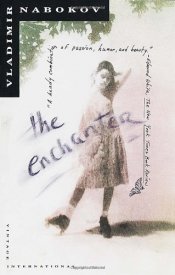Peder said:
I've heard it said that all truly great works of art are different. That no author or artist of any sort is famous because they copied some other famous artist. They are famous because the did something different. And I don't think I'd get any argument that Lolita is different!
Agreed. Lolita is very very different.
There is only one story.
What's it about?
That's probably the best question you'll ever ask, and I apologize for responding with a really lame answer: I don't know. It's not about anything. It's about everything. Its not about something, the way an elegy is about the death of a friend. It's about everything that anyone wants to write about. I suppose that ur-story is about ourselves, about what it means to be human. I mean, what else is there? ...we are interested in ourselves in space, or in time, in the world. So what our poets and storytellers do for us -- drag a rock up to the fire, have a seat, listen to this one -- is explain us-and-the-world or us-in-the-world."
I so wish I had never seen this post last night

After a very restless night mulling over those words, arguing with myself, arguing with him, Thomas C. Foster, whoever he is, and arguing with myself again. There can't possibly be only one kind of book... ok, so I see why novels about murder or other crimes might fit the bill, because none of us are all good or all bad, and we all have 'limits' or levels "social responsibility". I can see why insights into the lives of certain characters might, or possibly love stories, accounts of wars, or accounts of anything really.
So then I thought what about books featuring animals, like Black Beauty, or The Jungle Book, even. And I realised that these books almost exclusively feature people too, and those that don't, are written from the view of a person, because that's all you can ever get.
So then I pondered on the sci-fi and fantasy genres... briefly, since I don't tend to read much of those, but I wondered if this 'one type of book' suggestion fits Lord of The Rings, or Narnia books, and I got a bit lost...
And then I focussed on individual titles, ones I had read, randomly:
- Dubliners, by Joyce - a resounding yes
- Life of Pi, by Yann Martel - yes again
- We Need To Talk About Kevin, by Lionel Shriver - definitely
- Sophie's World, by Jostein Gaarder - yes, yes, yes
- The Color Purple, by Alice Walker - yes
- Lord of the Flies - YES!!
- To Kill a Mockingbird - sadly, yes
- Lolita...
Peder said:
So I offer that for everyone's consideration. Is Lolita so different as to defy Foster's claim that all stories are one? It is not about 'ourselves' we will all say. Or is some part of it about ourselves in some way? Does it explain to us, in some way, us-and-the-world?
I guess Lolita does fit the rule. We have all been Lolita, a twelve year old, in need of a reliable parent, curious, rebellious. I don't know that we have all been HH, exactly (I don't really want to ponder too long on that one), but we all have regrets, we all have desires, many that we know are purely selfish, perhaps immoral. We all have the ability of convincing the reader (ourselves, and others, if necessary) that our actions are with good intentions.
I read somewhere that people have an inane need to confess our sins. Whether that's by writing a journal or diary, praying, telling a real, live confidant(e), or disclosing to the world by writing a novel, or appearing on Trisha (Jerry Springer(?)). We all have a Quilty in our lives...
Peder said:
And for those of us who come to like it, why do we do that? Are we ressponding just to Nabokov's formidable style and story-telling abilities, or are we perhaps finding out more about us-and-the-world?
I'm guessing it's both. The subject, of course must be conceivable (for Lolita), but also important is the style Nabokov writes, his sensitivity, non-judgmental (or more equally judging all parties involved) attitude, his empathy.
I'm not clever enough to answer this question any fuller, so I'll just sit back and read other replies









